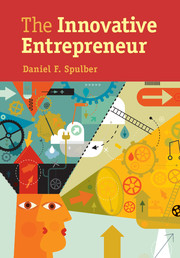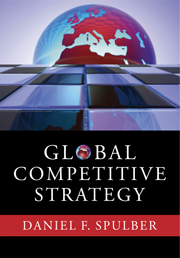The Innovative Entrepreneur
- Author: Daniel F. Spulber, Northwestern University, Illinois
- Date Published: September 2014
- availability: Available
- format: Paperback
- isbn: 9781107668119
Paperback
-
Innovative entrepreneurs are the prime movers of the economy. The innovative entrepreneur helps to overcome two types of institutional friction. First, existing firms may not innovate efficiently due to incumbent inertia resulting from adjustment costs, diversification costs, the replacement effect, and imperfect adjustment of expectations. The innovative entrepreneur compensates for incumbent inertia by embodying innovations in new firms that compete with incumbents. Second, markets for inventions may not operate efficiently due to transaction costs, imperfect intellectual property protections, costs of transferring tacit knowledge, and imperfect information about discoveries. The innovative entrepreneur addresses inefficiencies in markets for inventions through own-use of discoveries and adoption of innovative ideas. The Innovative Entrepreneur presents an economic framework that addresses the motivation of the innovative entrepreneur, the innovative advantage of entrepreneurs versus incumbent firms, the effects of competitive pressures on incentives to innovate, the consequences of creative destruction, and the contributions of the innovative entrepreneur to the wealth of nations.
Read more- Provides a general economic analysis of innovative entrepreneurs
- Presents an original theoretical framework that addresses innovation and entrepreneurship
- Highlights the contributions of innovative entrepreneurs by emphasizing individual initiative and creativity
Reviews & endorsements
'It is no coincidence that Dan Spulber has written this book on the economic contributions of the innovative entrepreneur's initiative and creativity, as it has been Spulber's own initiative and creativity that has been largely responsible for developing an economic theory of the innovative entrepreneur.' Robert J. Strom, PhD, Ewing Marion Kauffman Foundation
See more reviews'Having already established himself as one of the leading economic theorists of entrepreneurship of all time, Dan Spulber applies his analytical powers to the theory of innovative entrepreneurship, the most important kind for societies in the long run. This book will become a classic.' Robert Litan, Director of Research, Bloomberg Government
'A brilliant and prolific scholar of managerial economics, Daniel Spulber asks why people with new technologies sometimes start their own firms. They could develop the technology within existing firms, but choose to bring it to a new firm instead. The puzzle is not easy to solve but Spulber nicely does - by identifying the costs that incumbent firms would incur to readjust their focus, and the problems that inhere in the market for new technologies. This is a study that will profoundly change the way that we understand the role that new firms play in promoting innovation.' J. Mark Ramseyer, Harvard Law School
'Readers with a good grounding in mathematics and advanced microeconomic theory should find Spulber's formal analytical framework and synthesis helpful and informative.' Choice
Customer reviews
Not yet reviewed
Be the first to review
Review was not posted due to profanity
×Product details
- Date Published: September 2014
- format: Paperback
- isbn: 9781107668119
- length: 380 pages
- dimensions: 252 x 177 x 20 mm
- weight: 0.67kg
- contains: 24 b/w illus. 5 tables
- availability: Available
Table of Contents
1. Introduction
2. Entrepreneurial motivation: maximizing life-cycle utility
3. Innovative advantage: entrepreneurial initiative and incumbent inertia
4. Competitive pressures and entrepreneurial incentives to innovate
5. Creative destruction: transaction costs and intellectual property rights
6. Creative destruction: making new combinations
7. Creative destruction: tacit knowledge
8. Creative destruction: asymmetric information
9. The wealth of nations: international trade and investment
10. Conclusion.
Sorry, this resource is locked
Please register or sign in to request access. If you are having problems accessing these resources please email [email protected]
Register Sign in» Proceed
You are now leaving the Cambridge University Press website. Your eBook purchase and download will be completed by our partner www.ebooks.com. Please see the permission section of the www.ebooks.com catalogue page for details of the print & copy limits on our eBooks.
Continue ×Are you sure you want to delete your account?
This cannot be undone.
Thank you for your feedback which will help us improve our service.
If you requested a response, we will make sure to get back to you shortly.
×



